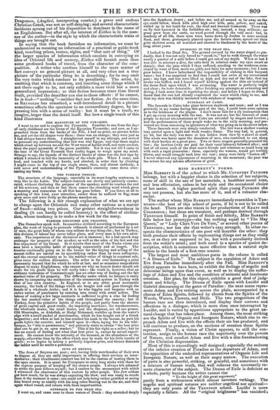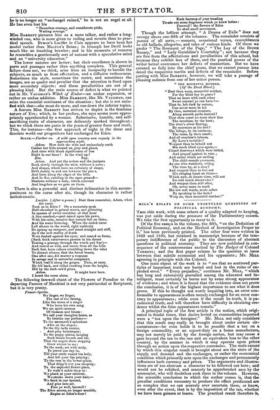MISS BARRETT'S POEMS.
MISS BARRETT is of the school to which Mr. COVENTRY PATMORR belongs, but with a happier choice in the selection of her subjects, more of skill in the use of her materials, a healthier moral tone, and less affectation, unless in her style and the occasional choice of her metre. A higher poetical spirit than young PATMORE she may not possess, but she has more of it, and of a robuster cha- racter.
The author whom Miss BARRETT immediately resembles is TEN.. NYSON—the best of this school of poets, if he is not to be called the head. There are also traces in her productions of KEATS and COLERIDGE ; but these are transient, and perhaps derived through TENNYSON himself. In point of finish and felicity, Miss BARRETT falls below her prototype—she has nothing equal to "The May Queen," or "Lady Clara Vere De Vere," or several other poems of TENNYSON; nor has she that writer's easy strength. In other re- spects the characteristics of one poet will describe the other: they both produce their effects by representing things not as they really are, or as they are supposed to be, but with a peculiarity derived from the writer's mind ; and both excel in a species of quaint de- scription, which is sometimes more effective than a natural style unless in the bands of a first-rate master.
The largest and most ambitious poem in the volume is called "A Drama of Exile." The subject is the expulsion of Adam and Eve from Paradise immediately after the Fall. Miss BARRErr's object appears to have been, to exhibit the feelings of angelic and demoniac beings upon that event, as well as to display the suffer- ings of Adam and Eve and the condition of animate and inanimate creation. Her plan, for this object, exhibits a good deal of judg- ment and felicity. The Drama of Exile opens with Lucifer and Gabriel discoursing at the gates of Paradise : the next scene repre, sents Adam and Eve retiring across the plain, accompanied by a chorus of Eden Spirits, followed by chants from the Spirits of the Woods, Waters, Flowers, and Birds. The two progenitors of the human race are then introduced, and display their sorrows and affections in a dialogue, which is more than once interrupted by Lucifer, and is varied by apparitions appropriate to the great na- tural change that has taken place. Among these, the most striking are the Spirits of Organic and Inorganic Nature, which rise to re- proach Adam and Eve with the effects their sin has produced, and will continue to produce, on the sections of creation these Spirits represent. Finally, a vision of Christ appears, to still the con- tention, assign to the human race the superiority over the powers of Nature, and comfort Adam and Eve with a dim foreshadowing of the Christian dispensation.
Most of this is exceedingly well designed; especially the sadness of the inferior creation of Paradise at the departure of Adam, and the apparition of the embodied representatives of Organic Life and Inorganic Nature, as well as their angry sorrow. The execution of parts is also powerful, striking, or graceful, and sometimes with a mixture of human truth, that well relieves the necessarily re- mote character of the subject. The Drama of Exile is deficient as a whole, partly because the writer cannot rise
"To the height of this great argument,"
partly from a verboseness which almost becomes verbiage. The angelic and spiritual natures are neither angelical nor spiritual— they are only poets of the TENNYSON school. Lucifer is more especially a failure. All the "original brightness" has vanished;
he is no longer an "archangel ruined," he is not an angel at all. He has even lost his
"Dauntless courage, and considerate pride, Waiting revenge."
Miss Basasrr pictures him as a mere talker, and rather a long- winded one, who is more given to railing and reverie than to prac- tical speech. BYRON'S Lucifer in Cain appears to have been her model rather than MILTON'S Satan ; in triumph her Devil looks much like an insulting brawler; and in his moments of remorse he resembles a gentlemanly sort of outcast with a speculative mind and an "university education." The lower natures are better; but their excellence is shown in parts and passages rather than anything complete. This general failure does not, we think, arise from an incapacity to handle the subjects, so much as from affectation, and a diffusive verboseness. Sometimes the style, sometimes the metre, and sometimes the images, are so quaint and peculiar that the attention is fixed upon mere secondary objects ; and these peculiarities are not of a pleasing kind. But the main source of defect is what we pointed out in Mr. VAUGHAN'S Witch of Endor—an undue expansion, or rather an undue addition. Miss BARRETT, like Mr. VAUGHAN, can seize the essential sentiment of the situation ; but she is not satis- fied with that—she must do more, and run down the inferior topics.
A feature Miss Bartaarr has striven to depict is the feminine nature of Eve ; which, in her preface, she says seems more appro- priately apprehended by a woman. Submissive, humble, and self- sacrificing traits of character, are delicately marked throughout ; but we think there are parts in the poem of greater force and truth. This, for instance—the first approach of night in the drear and desolate world our progenitors had exchanged for Eden.
Scisrus.—Fareher on. A wild open country seen vaguely in the approaching night.
Adam. How doth the wide and melancholy earth Gather her hills around us, gray and ghost, And stare with blank significance of loss Right in our faces! Is the wind up ?
Eve. Nay.
Adam. And yet the cedars and the junipers Rock slowly through the mist, without a noise; And shapes, which have no certainty of shape, Drift duskly in and out between the pines, And loom along the edges of the hills, And lie flat, curdling in the open ground— Shadows without a body, which contract And lengthen as we gaze on them.
There is also a powerful and distinct delineation in this accom- paniment to the curse after sin, though its character is rather melodramatic.
Lucifer. (After a pause.) Dost thou remember, Adam, when the curse Took us in Eden ? On a mountain-peak Half-sheathed in primal woods, and glittering In spasms of awful sunshine, at that hour A lion couched,—part raised upon his paws, With his calm, massive face turned full on thine, And his mane listening. When the ended curse Left silence in the world, right suddenly He sprang up rampant, and stood straight and stiff, As if the new reality of death Were dashed against his eyes; and roared so fierce, (Such thick carnivorous passion in his throat
Tearing a passage through the wrath and fear)—
And roared so wild, and smote from all the hills Such fast, keen echoes crumbling down the vales To distant silence, that the forest beasts, One after one, did mutter a response In savage and in sorrowful complaint, Which traird along the gorges. Then, at once, He fell back, and rolled crashing from the height, Hid by the dark-orb'd pines.
Adam. It might have been. I heard the curse alone.
The following farewell chant of the Flowers of Paradise to the departing Parents of Mankind is not very patriarchal or Scriptural, but it is very pretty.
Flower-Spirits.
We linger, we linger, The last of the throng, Like the tones of a singer Who loves his own song. We are spirit-aromas Of blossom and bloom : We call your thoughts home, as
Ye breathe our perfume—
To the amaranth's splendour Afire on the slopes; To the lily-bells tender, . And grey heliotropes; To the poppy-plains, keeping Such dream-breath and ble, That the angels there stepping Grew whiter to see; To the nook, set with moly, Ye jested one day in, Till your smile waxed too holy, And left your lips praying ; To the rose in the bower-place, That dripp'd o'er you sleeping; To the asphodel flower-place, Ye walk'd ankle-deep in We pluck at your raiment,
We stroke down your hair,— W e faint in our lament,
And pine into air.
Fare ye well, farewell !
The Eden scents, no longer sensible, lespitu at Eden's-door!
Each footstep of your treading
Treads out some fragrance which ye knew before:
Farewell! the flowers of Eden Ye shall smell nevermore.
Though the loftiest attempt, "A Drama of Exile" does not occupy above one-fifth of the volumes. The remainder consists of
poems of all sorts, — sonnets, occasional verses, resemblances to old ballads, allegories, and tales of various kinds. Of these we prefer "The Romaunt of the Page," "The Lay of the Brown Rosary," and "Lady Geraldine's Courtship "; not because they
are free from the affectations and peculiarities of this school, but
because they exhibit less of them, and the poetical power of the writer better overcomes her defects of mannerism. But we have entered so fully into the chief poem, that we cannot pursue into detail the respective merits and defects of the remainder. Before
parting with Miss BARRETT, however, we will take a passage of
pleasing sadness from one of her minor poems.
"THE MOURNFUL MOTHER.
(Of the Dead Blind.)
"post thou weep, mournful mother, For thy blind boy in grave ? That no more with each other Sweet counsel ye can have ?- That he, left dark by nature, Can never more be led By thee, maternal creature, Along smooth paths instead ? That thou canal no more show him The sunshine, by the heat ; The river's silver flowing, By murmurs at his feet ? The foliage, by its coolness; The roses, by their smell ; And all creation's fulness, By Love's invisible ?
Weepest thou to behold not His meek blind eyes again,—
Closed doorways which were folded, And prayed against in vain ; And under which sat smiling The child-mouth evermore, As one who watcheth, wiling The time by, at a door? And weepest thou to feel not
His clinging hand on thine—
Which now, at dream-time, will not Its cold touch disentwine ?
And weepest thou still oiler, Oh, never more to mark His low soft words, made softer By speaking in the dark? Weep on, thou mournful mother!"



























 Previous page
Previous page